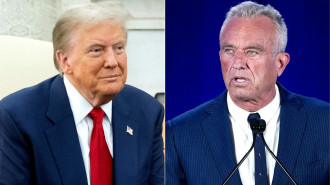OPEC maintains output target, despite low oil price
OPEC ministers have opted to leave oil output unchanged, after a fresh drop in crude prices.
The meeting in Vienna of the oil producing carterl on Friday comes amid fears from smaller producers that oversupply has caused prices to sink too low.
Ali al-Naimi, Saudi Arabia's oil minister said that the cartel decided to keep the same official output target of 20 million barrels a day.
"The ceiling is the same. You will be surprised how amicable the meeting was," Naimi told reporters.
Saudi Arabia, the world's largest oil producer, has faced criticism from non-oil OPEC countries such as Oman, for keeping oil production levels the same, despite tumbling prices.
Oman and Bahrain need much higher prices to break even after government spending was ramped up during the Arab Spring.
Now they are faced with potentially crippling deficits with thousands of extra government workers on their books and costly subsidies that Manama and Muscat are trying to end.
Saudi Arabia expressed satisfaction over a rebound in price levels since the start of the year, as a result of the brighter outlook for the world economy and energy demand.
"Demand has been growing and supply diminishing," Naimi said before Friday's meeting.
"The situation is improving and we hope it will continue improving," added Naimi, who also denounced media speculation over his retirement as "a pack of lies".
Trusting the market
Saudi Arabia believes that continuing current rates of production will retain Opec's market share - currently a third of the world's oil supplies - and price US shale producers out of the market.
Other ministers have declared they would be happier with prices between $75 and $80 a barrel to boost revenues and help balance their budgets.
| This (current) level of price is not good for many of the OPEC members. Bijan Zanganeh, Iran's oil minister |
Angola, Ecuador, Iran, Iraq and Venezuela have all appealed for higher prices that encourage investment.
"This (current) level of price is not good for many of the OPEC members," said Bijan Zanganeh, Iran's oil minister.
"Most of the OPEC members believe that the price around $75 is a fair price for both sides of the market."
Analysts fear the market could be further saturated with oil from Iran should Western sanctions be lifted after a nuclear deal with world powers.
Zanganeh already revealed earlier this week that it could ramp up oil production by an extra one million barrels per day, within half a year of sanctions being removed.
He has written to fellow ministers asking them to consider Tehran's return to the market.
"Iran wants to raise (output) and the conference will discuss it," OPEC Secretary-General Abdullah al-Badri said, while Naimi described the Islamic republic's oil production as a "sovereign right".







 Follow the Middle East's top stories in English at The New Arab on Google News
Follow the Middle East's top stories in English at The New Arab on Google News
![The new film casts Israeli actors to tell the story of Mary while leaving out Palestinians [Getty]](/sites/default/files/styles/image_330x185/public/2024-11/GettyImages-2172155541.jpg?h=199d8c1f&itok=wJWyXDEQ)
![Ben & Jerry's has taken Unilever to court for its alleged attempts to silence it [Getty]](/sites/default/files/styles/image_330x185/public/2024-11/GettyImages-2183900214.jpg?h=199d8c1f&itok=jEcYtQ64)
